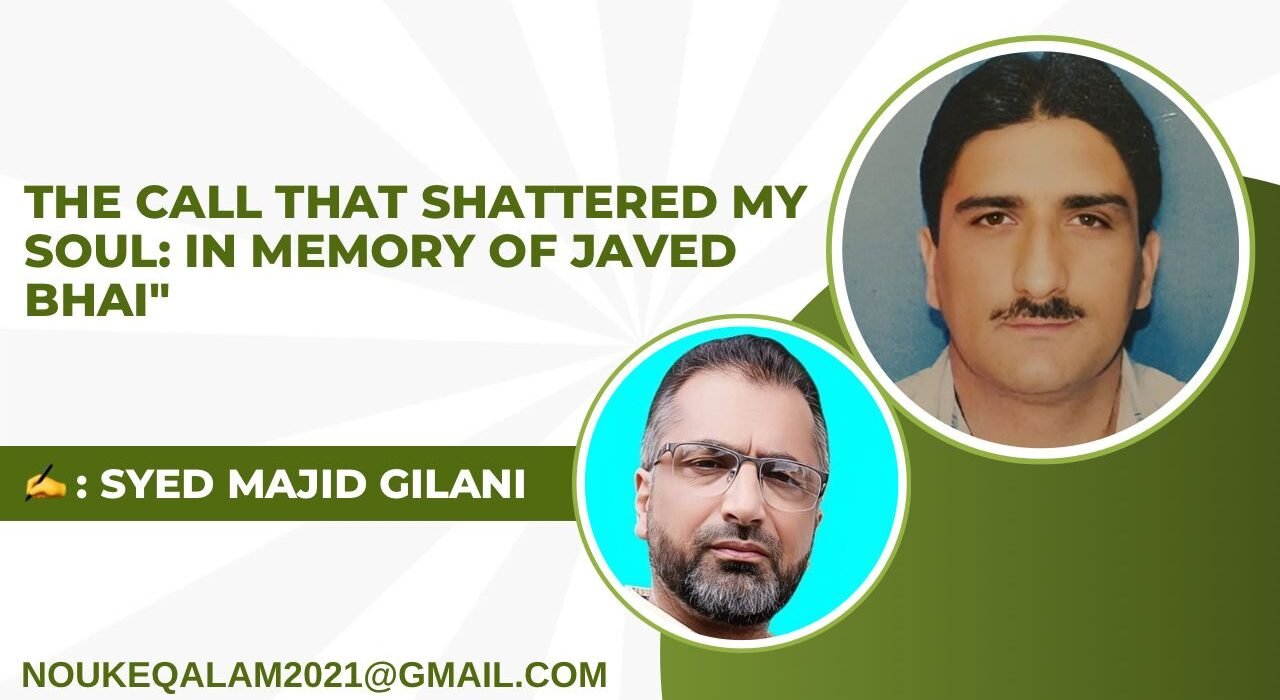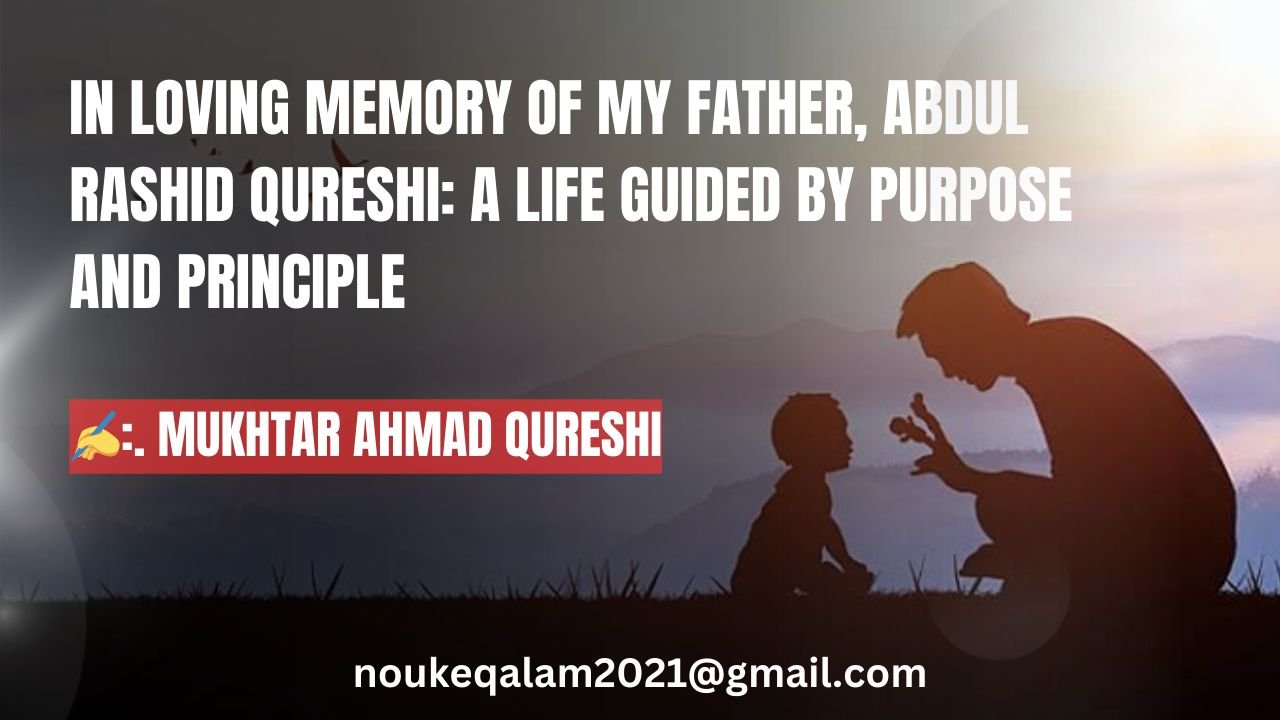It was the 19th of Ramadan, July 30, 2013—a peaceful and blessed day filled with fasting and prayers.
I was home that day, enjoying a day off from duty. I had been posted at the Lower Munda Check Post along the Srinagar–Jammu highway. Around 11 in the morning, my phone rang. It was my cousin, Er. Syed Javed Nazir Mantaqi.
“Assalam-u-alaikum, Majid. Are you at your post today?” he asked.
“No, brother. I’m at home. It’s my day off,” I replied.
“Oh… I was planning to stop by on my way to Baglihar Dam for duty.”
We were both disappointed. We had just missed the chance to meet—by only a few hours. Had I been on duty, we might have shared a short conversation, perhaps even offered Zuhr prayers together. But Allah had written something else.
The day passed peacefully—fasting, prayers, and anticipation of iftar.
Then, just before sunset, came the phone call I can never forget. A call that chilled me to the bone.
“Javed met with a terrible accident near Ramban… and he didn’t survive.”
I was stunned. I had spoken to him just hours earlier. His voice still echoed in my mind. I couldn’t believe he was gone.
A sudden chill ran through me. Pain gripped my chest, and my hands trembled as I held the phone.
How could someone so full of life be gone so suddenly?
Javed was in his early forties—tall, graceful, brave, and strong. He had a kind and peaceful nature. A practicing Muslim, deeply spiritual, and respectful to all. His eyes were always lowered in humility. He was the kind of person anyone would be proud to call a brother or a friend.
He had a deep love for Sufi saints, frequently visiting their revered shrines—Khanqah-e-Moula, Makhdoom Sahib, Naqshband Sahib, Baba Reshi—but most often, the sacred shrine of Charar-e-Sharif. His spiritual routine was unwavering: he recited the Qur’an Sharif, Aurad-e-Fathiyah, and Kibrat-e-Ahmar every day with quiet devotion.
And now… he was no longer with us.
I gathered my courage and called his family—his father and brothers—to share the heartbreaking news:
“There has been an accident… Javed is no longer with us.”
But they already had a feeling. A few phone calls had hinted that something terrible had happened. Still, they were praying it wasn’t true.
We rushed to his home at Khanqah-e-Moula. As soon as we arrived, we were surrounded by grief. Family, friends, and neighbors were in shock. Some still hoped it was a mistake. But sadly, it wasn’t.
Later, we learned more about Javed’s final day. That morning, after sehri with his family, he had offered Fajr prayers, attended an official meeting at the Srinagar head office, and then left for Baglihar Dam. He was fasting.
On the way, he called his cook and said, “Prepare food for Iftar. I’ll reach Baglihar before sunset.” He also spoke to his family multiple times that day. Everything had seemed normal. But fate had other plans.
Javed had traveled the Ramban road countless times—on his motorcycle or in his old Maruti 800. But this time, he was in his new Santro car. The accident occurred at Digdol in Ramban district, a hilly, dangerous stretch of the Jammu–Srinagar National Highway known for its sharp curves and landslides.
Somewhere near Digdol, his car slipped off the narrow road and plunged into a deep gorge.
But by the mercy of Allah, his body wasn’t lost. As the car rolled down, his body was flung out and caught in the branch of a tree just a few feet below the roadside. His shirt tangled in the branch. That tree saved his body from falling deep into the rocky gorge, where we may never have found him.
When his body was recovered, it had only minor bruises. His face looked calm and peaceful—like he was merely asleep.
That midnight, his body was brought to Srinagar and kept at the mortuary. The next morning, when he was brought home, the entire neighborhood stood in silence. People wept openly. Friends, relatives, colleagues—even strangers—all said the same thing: “He was a good man. Such a good man.”
We offered his funeral prayers and buried him in the ancestral graveyard within the compound of the Khanqah-e-Moula shrine. That holy ground embraced him like a mother welcoming her child.
Today, at the Baglihar Dam site—where Javed served with dedication as one of the first junior electrical engineers of the JK Power Development Corporation—a marble plaque stands in his memory. That plaque is more than just a name in stone. It is a tribute to a life of faith, duty, and integrity.
He left this world while fasting, on duty, remembering Allah—a noble end to a noble life.
Javed Baya began his education at Burn Hall School, Srinagar, up to Class 10, continued 11th and 12th at Tyndale Biscoe School, and completed his B.Tech in Electrical Engineering from Dr. Ambedkar College, Bangalore. He joined JKSPDC in 2002 as a young, committed engineer.
Some of his college batchmates remember his gentle, melodious voice. He often sang soulful Urdu ghazals and timeless songs of Mohammad Rafi, Kishore Kumar, and Kumar Sanu—leaving listeners deeply moved.
It has been twelve long years since he left us, yet not a single day passes without his memory in our hearts. His love, his advice, his peaceful presence—everything still lives within us.
On his 12th death anniversary, I remember him with love, prayers, and deep respect. His absence is felt every day, but his legacy lives on—in our hearts, in our stories, and in the quiet moments of remembrance.
May Allah grant him the highest place in Jannat-ul-Firdous. Ameen.
About the Author:
Syed Majid Gilani is a government officer by profession and a storyteller by passion. He writes about family values, moral wisdom, pain, and real-life emotions. He can be reached at syedmajid6676@gmail.com.





